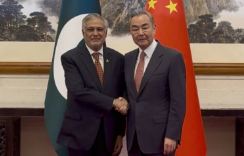In a significant diplomatic engagement, Chinese Foreign Minister Wang Yi visited Pakistan this week to discuss the ongoing progress of the China-Pakistan Economic Corridor (CPEC) and the bilateral cooperation between the two countries. The visit underscored China’s commitment to deepen ties with Pakistan and highlighted both the achievements and challenges faced in the ambitious CPEC project.
Wang Yi expressed China’s strong desire to continue developing Pakistan through enhanced economic and infrastructural cooperation. “China views Pakistan as a key partner in its Belt and Road Initiative and is dedicated to supporting Pakistan’s socio-economic development,” Wang stated during his meetings with Pakistani leaders. The visit aimed to review the current status of CPEC Phase 2 projects, which include energy, infrastructure, and industrial cooperation sectors, emphasizing mutual benefits.
While CPEC has made notable progress since its inception, the Foreign Minister acknowledged that the corridor faces multiple hurdles. Among the most significant issues highlighted was the security situation in Balochistan. The province has long been a hotspot for insurgencies and terrorist activities, posing risks to Chinese personnel and infrastructure. Wang Yi referenced the tragic losses China has suffered in the region, where several Chinese nationals have been targeted and killed by militant groups.
“Security concerns remain the greatest challenge for CPEC’s full potential to be realized,”. He called for stronger collaboration between Pakistan’s security forces and Chinese experts to ensure the safety of workers and assets involved in the projects. Both sides agreed that counterterrorism efforts must intensify, and political stability in Balochistan is crucial for the corridor’s uninterrupted progress.
China has invested heavily in Pakistan over the years, with billions of dollars committed to building roads, power plants, and industrial zones. Wang emphasized that despite the challenges, China cannot simply abandon its investments and partnerships in Pakistan. .
On the diplomatic front, discussions also touched upon Pakistan’s balancing act between China and the United States. Pakistan has carefully maintained its ties with both powers amid increasing tensions and global competition. The United States has reportedly urged Pakistan to reduce its dependence on China, pushing Islamabad to diversify its alliances and economic partners.
However, Pakistani officials made it clear that reducing reliance on China is not feasible at this stage. The deep-rooted economic involvement, especially through CPEC, makes Pakistan-China cooperation vital for Islamabad’s development agenda. Pakistan views its partnership with China as both a geopolitical necessity and an economic opportunity, while still keeping diplomatic channels open with the US.
Wang Yi concluded his visit by reaffirming China’s vision of a “win-win” relationship with Pakistan and pledged to work through current challenges together. Both sides agreed to accelerate the implementation of CPEC Phase 2 initiatives and enhance security measures to protect ongoing projects.
In summary, the visit of Chinese Foreign Minister Wang Yi served as a reminder of the strategic importance China places on Pakistan amidst regional complexities. While progress on CPEC continues, addressing the security and political issues in Balochistan remains paramount. Pakistan’s position of balancing relations between China and the US continues to be delicate, but its commitment to China’s partnership appears steadfast in the foreseeable future. The success of CPEC will depend largely on how well both countries manage these intertwined challenges moving forward.

















